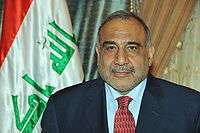Vice President of Iraq
| Vice President of Iraq | |
|---|---|
|
| |
|
Incumbent position vacant since 10 October 2016 | |
| Style | His Excellency |
| Appointer | Parliamentary vote |
| Term length | Four years, renewable once |
| Formation |
14 July 1958 10 October 2016 |
| Final holder |
Nouri al-Maliki Osama al-Nujaifi Ayad Alawi |
| Abolished | 11 August 2015 |
_of_Iraq_2008.svg.png) |
| This article is part of a series on the politics and government of Iraq |
| Constitution |
|
Legislature |
|
Judiciary |
|
Iraq has three vice presidents or deputy presidents, although a debate is ongoing about a reform to abolish their posts.
The office of Vice President was largely ceremonial but prestigious. In post-war Iraq, the Constitution of Iraq, in its "Transitional Guidelines," creates a three-member Presidency (or Presidential) Council, consisting of the President of the Republic and two vice (or deputy) presidents, who must act in unison. The Presidency Council had three members to accommodate Iraq's three largest groups: Sunni Muslim Arabs, Shiite Muslim Arabs, and (mostly Sunni) Kurds. As a unit, the Presidency Council was meant to symbolize the unity of the nation. This arrangement is required by the constitution to continue until the Council of Representatives, enters its second set of sessions. At this point, the Presidency Council would be replaced by a solitary President of the Republic, who would also have one deputy. In any case, the Presidency is appointed by the Council of Representatives.
This three-member arrangement was a hold-over from the Iraqi interim government and the Iraqi Transitional Government.
On 13 May 2011, three vice-presidents were elected.[1] On July 11, 2011, Adil Abdul-Mahdi resigned after he had presented his resignation to President Jalal Talabani on May 30, 2011. (Al-Aswat) (USA Today)
In September 2014, three new Vice Presidents where elected: former Prime Ministers Nouri al-Maliki and Ayad Allawi and former Speaker of Parliament Osama al-Nujaifi.
On August 11, 2015 the Council of Representatives approved the al Abadi Government's plan to abolish the posts of both Vice President and Deputy Prime Minister. Further steps are required to effectively abolish them.[2] Later, Osama al-Nujaifi filed a complaint against the decision, considering it to be against the Constitution.[3] Also Nuri al-Maliki promised to cling to his post.[4] As of December 2015, Maliki is still using the title of "First Vice President" on what appears to be the official website of this institution.[5] Also international media continue referring to Maliki as "Vice President of Iraq".[6]
On 10 October 2016, the office is recreated but the new vice president is not yet appointed.[7]
Vice-Presidents of Ba'athist Iraq
The Ba'athist regime of Ahmed Hassan al-Bakr and Saddam Hussein also used the office of Vice President. However, the post was not as influential as Vice chairmen of Revolutionary Command Council in Ba'athist Iraq. Vice Presidents were appointed on the discretion of the President.
| Name | Entered office | Left office |
|---|---|---|
| Ahmed Hassan al-Bakr | November 1963 | January 1964 |
| Saddam Hussein | November 1969 | July 1979 |
| Hardan al-Tikriti | April 1970 | October 1970 |
| Salih Mahdi Ammash | April 1970 | December 1971 |
| Taha Muhie-eldin Marouf | April 1974 | May 2003 |
| Taha Yassin Ramadan | March 1991 | May 2003 |
Vice-Presidents of post-Ba'athist Iraq
| Name | Portrait | Born-Died | Entered office | Left office | Political party | |
|---|---|---|---|---|---|---|
| Ibrahim al-Jaafari إبراهيم الجعفري |
 |
1947– | 1 June 2004 | 7 April 2005 | Islamic Dawa Party | |
| Rowsch Shaways روز نورى شاويس |
_of_Iraq_2008.svg.png) |
1947– | 1 June 2004 | 7 April 2005 | Kurdistan Democratic Party | |
| Adil Abdul-Mahdi عادل عبد المهدي |
 |
1942– | 7 April 2005 | 11 July 2011 | Islamic Supreme Council of Iraq | |
| Ghazi Mashal Ajil al-Yawer غازي مشعل عجيل الياور |
 |
1958– | 7 April 2005 | 22 April 2006 | The Iraqis | |
| Tariq al-Hashimi طارق الهاشمي |
 |
1942– | 22 April 2006 | 10 September 2012 | Iraqi Islamic Party | |
| Khodair al-Khozaei |
_of_Iraq_2008.svg.png) |
1947– | 13 May 2011 | 9 September 2014 | Islamic Dawa Party – Iraq Organisation | |
| Nouri al-Maliki نوري المالكي |
 |
1950– | 9 September 2014 | 11 August 2015[8] | Islamic Dawa Party | |
| Osama al-Nujaifi |
 |
1956– | 9 September 2014 | 11 August 2015 | Muttahidoon | |
| Ayad Allawi أياد علاوي |
 |
1945– | 9 September 2014 | 11 August 2015 | Iraqi National Accord | |
| Post abolished (11 August 2015–10 October 2016) | ||||||
| Vacant (10 October 2016–present) | ||||||
References
- ↑ http://english.people.com.cn/90001/90777/90854/7379161.html
- ↑ http://www.washingtonpost.com/blogs/monkey-cage/wp/2015/08/14/premature-excitement-about-iraqs-new-government-reforms/
- ↑ http://www.middleeasteye.net/news/iraq-vice-president-files-court-case-keep-post-521531666
- ↑ http://english.aawsat.com/2015/09/article55344978/iraq-maliki-nujaifi-say-pms-decision-to-cancel-vice-president-posts-unconstitutional
- ↑ http://www.vpo.iq/
- ↑ http://news.yahoo.com/turkey-risks-sparking-world-war-says-iraqs-maliki-113845036.html|AFP
- ↑ http://www.lorientlejour.com/article/1011910/irak-la-suppression-des-postes-de-vice-president-invalidee-par-la-justice.html
- ↑ http://english.aawsat.com/2015/09/article55344978/iraq-maliki-nujaifi-say-pms-decision-to-cancel-vice-president-posts-unconstitutional